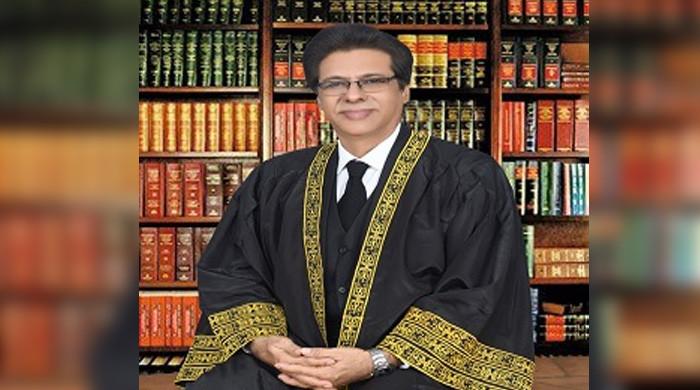- Judge Commandkhail asks if ATC had authority to deny custody.
- Judge Amin asks about the judicial authority about cases of cases.
- The Court postponed the hearing on civil trials of civilians until tomorrow.
Islamabad: The judge of the Supreme Court, Muhammad Ali Mazhar, asked Monday about the stage from where civilians would resume if the cases are transferred from a military court to an anti -terrorist court (ATC).
The consultation was raised during the Intra-Court Appeals Hearing against the military trial of civilians before a Constitutional Bank of the Superior Court.
The bank, led by Judge Amin Uddin Khan and including other judges, including Judge Mazhar, Judge Jamal Khan Commandkhail, Judge Hassan Azhar Naqvi and Judge Naeem Afghan, the arguments of the civil society Faisal Siddiqi, who had the question of the main senses of civil society, but the judgment of the law.
Judge Amin said that the transfer of suspects was a matter of registration and asked if the lawyer had challenged section 94 of the Army Law.
Siddiqi replied that at the time of the custody of the suspects, their crimes had not yet been determined, and that the unlimited discretionary power granted under section 94 had also been challenged.
He argued that an officer in command initiates a transfer application under section 94, and that the officer who makes the decision has unlimited authority, unlike the prime minister, who has limited powers. He stressed that there should be a structured framework for such powers.
Given this, Judge Naqvi questioned whether police investigations were slower compared to military trials and asked if there were sufficient evidence at the time of the delivery of the suspects. Siddiqi replied that the presence or absence of evidence was not the problem, but rather the absolute authority to transfer suspects.
Here, Judge Commandkhail asked if an ATC had the authority to reject a request for delivery. To which, Siddiqi responded. Judge Amin commented that such a defense on behalf of the suspects could have been carried out before the ATC or an appeal.
Meanwhile, Judge Mazhar asked if the court had decided the request of the officer in command without notifying the suspects.
Given this, Judge Commandkhail said that section 94 applies only to those under the law of the army, and after the decision of the ATC, the suspects fell under said law. He commented that the ATCs also had the authority to reject the commander’s request.
Siddiqi argued that the decision to carry out a martial court would be taken before the custody of the suspects, questioning how a delivery could occur without a prior martial court decision.
Here, Judge Naqvi asked if the commander’s custody request provided some reason. Given this, Siddiqi reported the bank that no reason had been mentioned in the request of the commander.
However, Judge Afghan intervened, saying that the reasons had been declared in the application, specifically citing crimes under the Law of Official Secrets.
Judge Commandkhail pointed out that the procedure to register a complaint by virtue of the Law of Official Secrets is clearly described in the Code of Criminal Procedure, which requires that a magistrate register a statement and decide if an investigation is necessary.
Siddiqi said the complaint could be in the form of the case and that only the federal government can file a complaint under the law of official secrets. Any private individual has no authority to submit said application, he added.
This was the stage in which Judge Mazhar raised the key question: “If the cases are transferred from the military courts to the ATC, from what point the trial would begin? Will it begin again or will it be based on the evidence recorded during the military trial?
Judge Amin asked whether to invoke the doctrine of past and closed transactions would validate the military trial. Siddiqi replied that the military trial was challenged under article 245 of the Constitution.
Given this, the judge pointed out that article 245 was not in force on May 9, but had been implemented when the requests were presented.
After these discussions, the Constitutional Bank postponed the hearing on Intra-Court appeals against military judgments of civilians until tomorrow.




